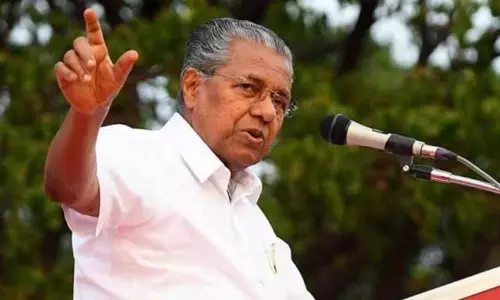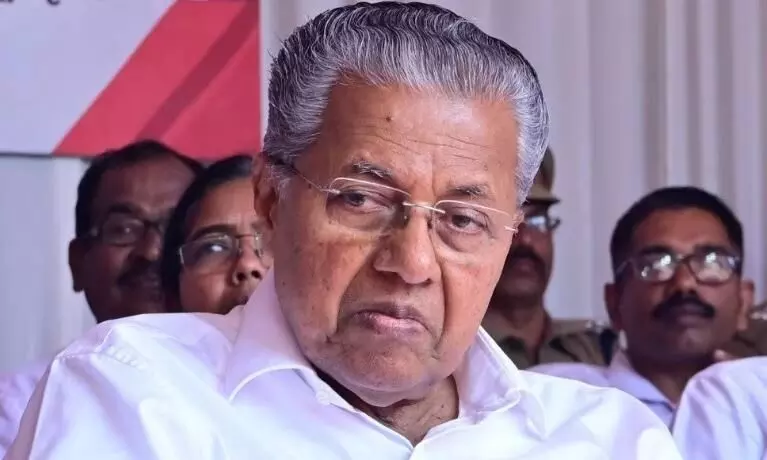
Liquor-capitalism's own country
text_fieldsIt has transpired that the state is inviting with meal and feast a liquor manufacturing company to Kerala. The government is welcoming the liquor company through a fast-track order to Palakkad, where the people of the state had driven out the Coca-Cola company, which had made life difficult due to the draining of precious water and polluting drinking water. The Pinarayi government has given permission to Madhya Pradesh-based Oasis Commercial Private Limited to set up a foreign liquor factory in Kanchikode. The project document states that groundwater is not required. It is also planned to collect rainwater. Meanwhile, water will be taken from the Malampuzha dam for the brewery to be set up by the Water Authority at the Kinfra Park in Palakkad. The availability of rice, which is one of the raw materials, is one of the reasons for choosing Palakkad. In the first phase, an ‘Indian-made foreign liquor’ manufacturing unit will come up. In the second phase, spirit production will start, then brandy and winery will be in the third phase, and a brewery plant will be in the fourth. The company, with an investment of Rs 600 crore, aims to generate income for the government as well as employment. Another claim is that there will be no water exploitation and environmental pollution. The waste from the factory will be used to make fertilizer; the company will not cause any pollution, and those supporting the project say that 1,500 people will be directly employed, more will be indirectly employed, and the agricultural sector will benefit from the plant that uses rice and vegetables.
Previous to this, Coca-Cola Company had made some such claims about its Plachimada plant. In India, where unemployment is high, the main reason private companies cite for permission to operate is the availability of jobs. However, subsequent experience shows that this is a huge exaggeration. There are many such examples. Not exploiting water only means not digging wells. Generally, water is being pumped from Malampuzha, a major source of water in Palakkad, which faces water scarcity. The company requires 1 million litres of water every day. Without conducting a feasibility study on water availability, even the basic needs of drinking water and irrigation are not met during droughts, and now the industry is also going to drain it. There are allegations that corruption is behind the hasty approval of the liquor company. The approval was given without calling for tenders. And this is a company that is known to be involved in a corruption case of liquor policy. There are also allegations that things were 'fixed' by hiding many things. Two years ago, the company bought 24 acres in Kanchikode, keeping it a secret that it was for liquor production. The following year, the Kerala government changed its liquor policy. While the law prohibits distilleries and breweries, a provision was added to the rule to allow the production of extra-neutral alcohol (ENA). Now, under the guise of that, it has also granted permission to a liquor company. In Kerala, where the cabinet decision in the case of Wayanad Meppadi Township took two weeks to come into effect, the approval order for the liquor factory was taken in just 24 hours.
The ‘Left’ government, which is so wary of private companies, has already abandoned the public sector unit, Malabar Distilleries. The project to produce brandy there was stalled due to lack of water. Yet, the government is now proving its social commitment by taking full responsibility for providing water to a private brewery not far away. The liquor-economic policy that turns people's misery into money is also a symptom of the withered 'Left' ideology. The governments here currently lack the energy to change the drug-lottery economy of 'progressive' Kerala. The communist government also finds cash for the public treasury by increasing the availability of liquor. When on the one hand money is flowing in like this, it is little realised that on the other even more has to be spent on the social and health problems caused by alcohol. The influence of alcoholism is very big behind the recent increase in crimes in Kerala. The role of governments that have made alcohol consumption a habit is also not insignificant. Now, when we enter into alcohol production, there should be a serious consideration of the pros and cons. The company accused of corruption should not have been given space to make profits by spending a lot of essential resources in the name of a few uncertain benefits.

























